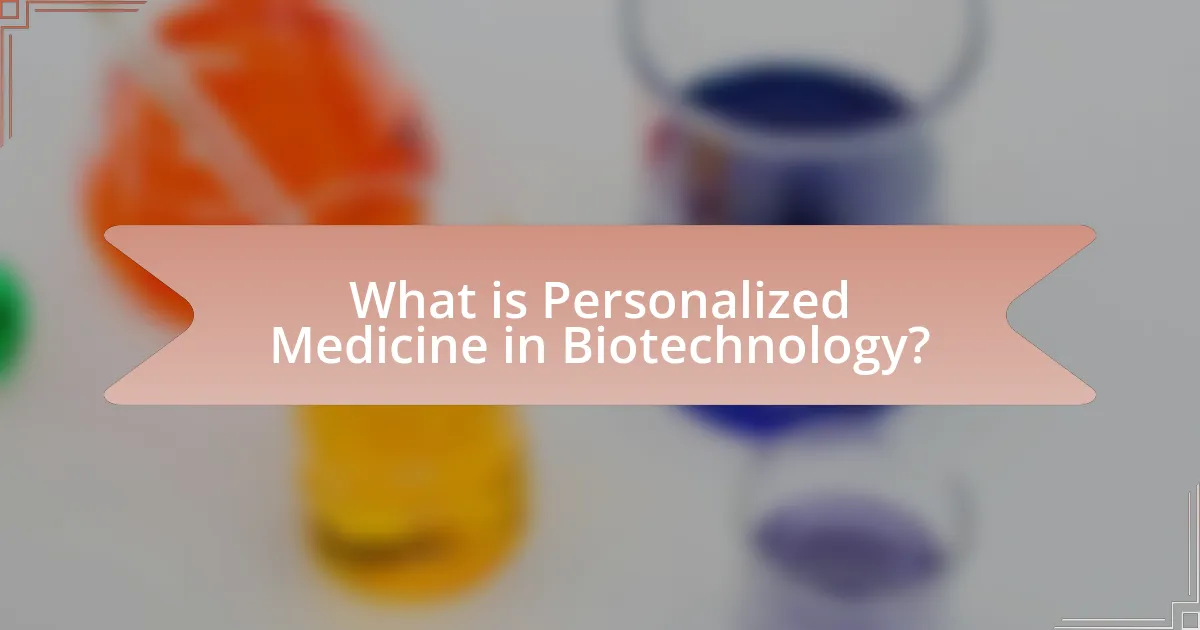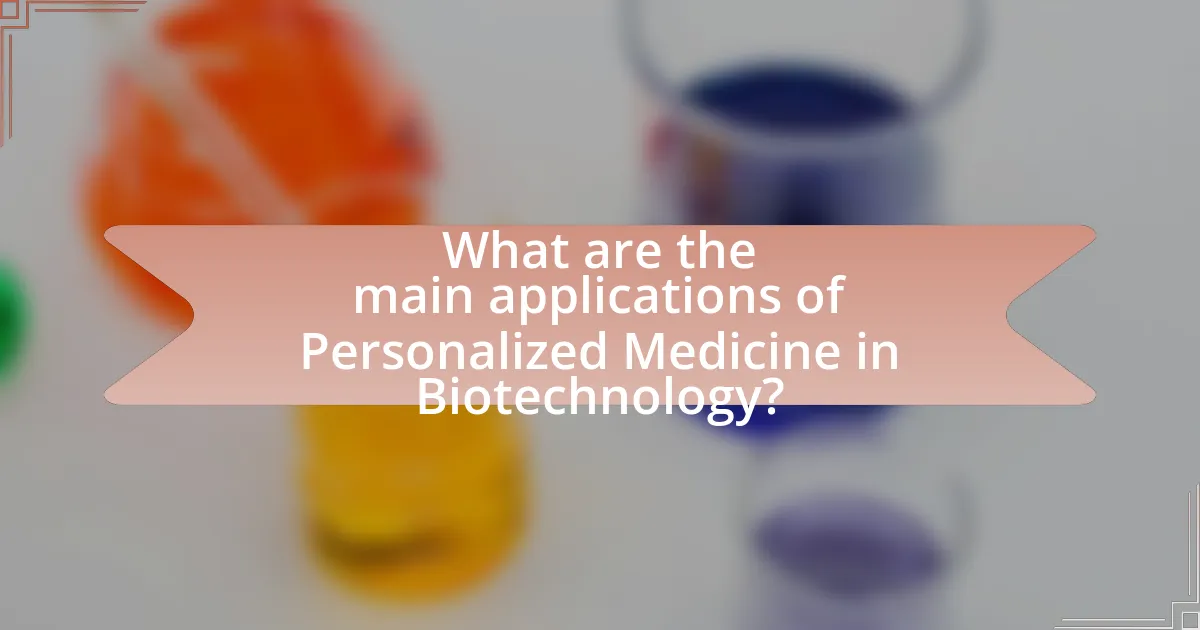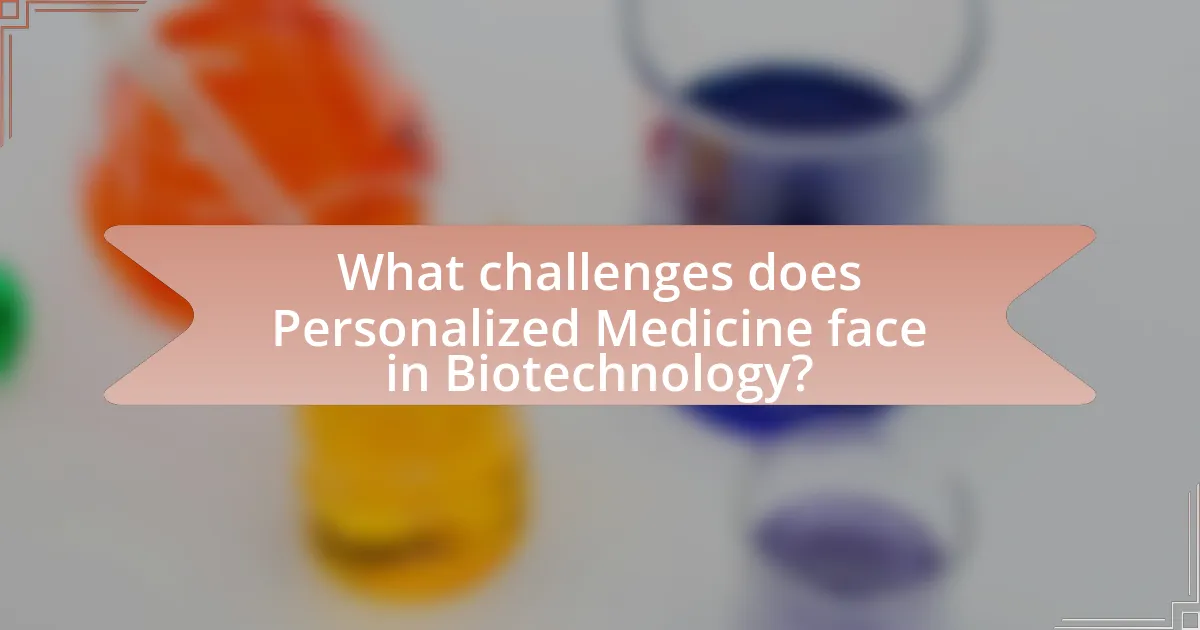Personalized medicine in biotechnology is a medical approach that customizes treatment based on individual patient characteristics, particularly genetic, biomarker, and phenotypic information. This article explores the differences between personalized and traditional medicine, highlighting key principles such as the use of genetic information and tailored treatment plans. It discusses the impact of personalized medicine on patient outcomes, its applications in various diseases including cancer, and the technological advancements driving its growth. Additionally, the article addresses challenges such as regulatory hurdles, ethical considerations, and the future trends shaping the landscape of personalized medicine.

What is Personalized Medicine in Biotechnology?
Personalized medicine in biotechnology refers to the tailoring of medical treatment to the individual characteristics of each patient, often based on genetic, biomarker, and phenotypic information. This approach enhances the effectiveness of therapies by considering the unique biological makeup of patients, leading to more precise diagnoses and targeted treatments. For instance, the use of genetic testing in oncology allows for the identification of specific mutations in tumors, enabling the selection of targeted therapies that are more likely to be effective for individual patients. Studies have shown that personalized medicine can improve patient outcomes, reduce adverse effects, and optimize healthcare resources, demonstrating its significant impact on modern medical practices.
How does Personalized Medicine differ from traditional medicine?
Personalized medicine differs from traditional medicine by tailoring medical treatment to the individual characteristics of each patient, rather than using a one-size-fits-all approach. Traditional medicine typically relies on standardized protocols based on population averages, while personalized medicine utilizes genetic, environmental, and lifestyle factors to inform treatment decisions. For example, targeted therapies in cancer treatment are designed based on specific genetic mutations present in a patient’s tumor, leading to more effective outcomes compared to conventional treatments that may not consider these individual differences. This shift towards personalization is supported by advancements in genomics and biotechnology, which enable more precise diagnostics and treatment options.
What are the key principles of Personalized Medicine?
The key principles of Personalized Medicine include the use of genetic information, tailored treatment plans, and patient-centered approaches. Personalized Medicine leverages an individual’s genetic makeup to inform treatment decisions, ensuring therapies are more effective and have fewer side effects. For instance, pharmacogenomics, which studies how genes affect a person’s response to drugs, allows for the customization of medication types and dosages based on genetic profiles. This approach has been validated by studies showing improved outcomes in cancer treatments when therapies are matched to specific genetic mutations present in tumors. Additionally, the integration of patient preferences and values into treatment plans enhances adherence and satisfaction, further supporting the efficacy of personalized approaches in healthcare.
How does genetic information influence treatment plans?
Genetic information significantly influences treatment plans by enabling personalized medicine, which tailors therapies based on an individual’s genetic makeup. This approach allows healthcare providers to predict how patients will respond to specific treatments, thereby improving efficacy and minimizing adverse effects. For instance, genetic testing can identify mutations in genes such as KRAS or EGFR, which are critical in determining the appropriate cancer therapies for patients. Studies have shown that patients with specific genetic profiles respond better to targeted therapies, leading to improved outcomes. This evidence underscores the importance of integrating genetic information into treatment planning to enhance precision in medical care.
Why is Personalized Medicine gaining popularity?
Personalized medicine is gaining popularity due to its ability to tailor treatments to individual genetic profiles, leading to more effective and targeted therapies. This approach enhances patient outcomes by minimizing adverse effects and improving treatment efficacy, as evidenced by the increasing use of genetic testing in clinical settings. For instance, studies have shown that patients receiving targeted therapies based on their genetic makeup experience higher response rates compared to those receiving standard treatments. The integration of advanced technologies, such as genomics and bioinformatics, further supports the growth of personalized medicine, making it a pivotal trend in modern healthcare.
What advancements in technology have contributed to its rise?
Advancements in genomics, bioinformatics, and data analytics have significantly contributed to the rise of personalized medicine in biotechnology. Genomic sequencing technologies, such as next-generation sequencing (NGS), allow for rapid and cost-effective analysis of an individual’s genetic makeup, enabling tailored treatment plans. Bioinformatics tools facilitate the interpretation of complex biological data, helping researchers identify genetic variations linked to diseases. Additionally, advancements in data analytics enable the integration of vast datasets from clinical trials and patient records, enhancing the ability to predict treatment responses. These technological innovations collectively support the shift towards more individualized healthcare approaches, improving patient outcomes and treatment efficacy.
How do patient outcomes improve with Personalized Medicine?
Patient outcomes improve with Personalized Medicine by tailoring treatments to individual genetic profiles, leading to more effective therapies and reduced adverse effects. This approach allows healthcare providers to select medications and dosages that are more likely to be effective based on a patient’s unique genetic makeup. For instance, studies have shown that patients with certain genetic markers respond better to specific cancer treatments, resulting in higher survival rates and improved quality of life. Additionally, Personalized Medicine can minimize trial-and-error prescribing, thereby accelerating the time to achieve optimal therapeutic results.

What are the main applications of Personalized Medicine in Biotechnology?
The main applications of Personalized Medicine in Biotechnology include targeted therapies, pharmacogenomics, and companion diagnostics. Targeted therapies utilize genetic information to tailor treatments for specific patient profiles, improving efficacy and reducing side effects. Pharmacogenomics studies how genes affect a person’s response to drugs, enabling the customization of medication types and dosages based on individual genetic makeup. Companion diagnostics are tests that help determine the suitability of a specific treatment for a patient, ensuring that therapies are aligned with the patient’s unique biological characteristics. These applications enhance treatment outcomes and optimize healthcare resources by focusing on individualized patient care.
How is Personalized Medicine used in cancer treatment?
Personalized medicine is used in cancer treatment by tailoring therapies based on the genetic makeup of an individual’s tumor. This approach allows for the selection of targeted therapies that are more effective for specific cancer types and patient profiles. For instance, the use of genomic sequencing can identify mutations in cancer cells, enabling oncologists to prescribe drugs that specifically target those mutations, such as trastuzumab for HER2-positive breast cancer. Studies have shown that personalized treatment plans can lead to improved outcomes, with a 2018 analysis indicating that patients receiving targeted therapies had a 30% higher response rate compared to those on standard treatments.
What role do biomarkers play in cancer therapies?
Biomarkers play a crucial role in cancer therapies by enabling personalized treatment strategies tailored to individual patient profiles. They serve as biological indicators that can predict disease progression, response to therapy, and potential side effects. For instance, the presence of specific genetic mutations, such as those in the EGFR gene, can determine the effectiveness of targeted therapies like gefitinib in non-small cell lung cancer. Studies have shown that patients with these mutations respond significantly better to targeted treatments compared to those without them, highlighting the importance of biomarkers in optimizing therapeutic outcomes.
How does targeted therapy enhance treatment effectiveness?
Targeted therapy enhances treatment effectiveness by specifically attacking cancer cells while sparing normal cells, leading to reduced side effects and improved patient outcomes. This precision is achieved through the identification of specific genetic mutations or molecular markers associated with an individual’s cancer, allowing for tailored treatment plans. For instance, drugs like trastuzumab target the HER2 protein overexpressed in some breast cancers, resulting in a significant increase in survival rates compared to traditional chemotherapy. Studies have shown that patients receiving targeted therapies often experience better responses and longer remission periods, highlighting the efficacy of this approach in personalized medicine.
What other diseases benefit from Personalized Medicine?
Personalized medicine benefits various diseases beyond cancer, including cardiovascular diseases, diabetes, and autoimmune disorders. For instance, in cardiovascular diseases, genetic profiling can identify individuals at risk for conditions like hypertension and hyperlipidemia, allowing for tailored prevention strategies. In diabetes management, personalized approaches can optimize treatment plans based on genetic and metabolic factors, improving patient outcomes. Additionally, autoimmune disorders such as rheumatoid arthritis can be managed more effectively through personalized therapies that consider individual genetic markers and responses to treatment. These applications demonstrate the broad potential of personalized medicine to enhance treatment efficacy across multiple disease categories.
How is Personalized Medicine applied in rare genetic disorders?
Personalized medicine is applied in rare genetic disorders through targeted therapies that are tailored to the individual genetic profile of patients. This approach utilizes genetic testing to identify specific mutations responsible for the disorder, allowing for the development of treatments that directly address these genetic anomalies. For instance, in conditions like cystic fibrosis, therapies such as CFTR modulators have been designed to correct the underlying genetic defect, significantly improving patient outcomes. The effectiveness of personalized medicine in these cases is supported by clinical studies demonstrating improved efficacy and reduced side effects compared to traditional one-size-fits-all treatments.
What impact does it have on chronic diseases like diabetes?
Personalized medicine significantly impacts chronic diseases like diabetes by tailoring treatment strategies to individual genetic profiles, lifestyle factors, and disease characteristics. This approach enhances the effectiveness of interventions, as evidenced by studies showing that personalized treatment plans can lead to better glycemic control and reduced complications in diabetic patients. For instance, research published in the journal “Diabetes Care” indicates that patients receiving personalized therapy based on genetic markers experienced a 30% improvement in blood sugar levels compared to those on standard treatments. This demonstrates that personalized medicine not only improves patient outcomes but also optimizes resource allocation in healthcare systems.

What challenges does Personalized Medicine face in Biotechnology?
Personalized medicine in biotechnology faces significant challenges, including high costs, regulatory hurdles, and data privacy concerns. The high costs stem from the need for advanced technologies and extensive research to develop tailored treatments, which can limit accessibility for patients. Regulatory hurdles arise from the complexity of approving personalized therapies, as they often require extensive clinical trials to demonstrate safety and efficacy for specific patient populations. Additionally, data privacy concerns are heightened due to the sensitive nature of genetic information, necessitating robust protections to maintain patient confidentiality while enabling the use of such data for personalized treatment development. These challenges collectively hinder the widespread adoption and implementation of personalized medicine in the biotechnology sector.
What ethical considerations arise with Personalized Medicine?
Ethical considerations in personalized medicine include issues of privacy, consent, and equity. Privacy concerns arise from the collection and use of genetic and health data, which can lead to potential misuse or discrimination. Informed consent is critical, as patients must fully understand how their data will be used and the implications of genetic testing. Additionally, equity issues emerge when access to personalized treatments is limited by socioeconomic status, potentially widening health disparities. These considerations highlight the need for robust ethical frameworks to guide the implementation of personalized medicine.
How do privacy concerns affect genetic data usage?
Privacy concerns significantly limit the usage of genetic data by creating barriers to data sharing and research collaboration. Individuals are often hesitant to provide their genetic information due to fears of misuse, discrimination, or breaches of confidentiality. For instance, a survey conducted by the Pew Research Center found that 60% of Americans are concerned about how their genetic data might be used by companies or governments. This apprehension can lead to reduced participation in genetic studies, ultimately hindering advancements in personalized medicine. Additionally, strict regulations like the Health Insurance Portability and Accountability Act (HIPAA) impose limitations on how genetic data can be collected, stored, and shared, further complicating its use in research and clinical settings.
What are the implications of genetic discrimination?
Genetic discrimination can lead to significant social and economic consequences for individuals based on their genetic information. This form of discrimination may result in denial of employment opportunities, health insurance coverage, or access to certain services, as individuals with genetic predispositions to certain conditions may be unfairly judged as higher risks. For instance, a study by the National Human Genome Research Institute indicates that 23% of individuals reported experiencing discrimination based on their genetic information, highlighting the prevalence and impact of this issue. Furthermore, genetic discrimination can exacerbate existing health disparities, as marginalized groups may face increased scrutiny and bias, ultimately hindering their access to personalized medicine and equitable healthcare solutions.
What are the regulatory hurdles for Personalized Medicine?
The regulatory hurdles for Personalized Medicine include the challenges of ensuring safety and efficacy, navigating complex approval processes, and addressing issues related to data privacy and genetic information. Regulatory agencies, such as the FDA, require extensive clinical trials to demonstrate that personalized therapies are both safe and effective for specific patient populations, which can be time-consuming and costly. Additionally, the need for clear guidelines on the use of genetic data in treatment decisions complicates the regulatory landscape, as there are concerns about patient consent and the potential for discrimination based on genetic information. These factors collectively hinder the rapid development and implementation of personalized medicine solutions in the healthcare system.
How do current regulations impact the development of Personalized therapies?
Current regulations significantly influence the development of personalized therapies by establishing safety, efficacy, and ethical standards that must be met before therapies can be approved for clinical use. Regulatory bodies, such as the FDA in the United States, require extensive clinical trials to demonstrate that personalized therapies are both safe and effective for specific patient populations, which can prolong the development timeline and increase costs. For instance, the FDA’s 2018 guidance on the development of gene therapies emphasizes the need for robust data on patient-specific responses, thereby shaping research priorities and funding allocations in the biotechnology sector. These regulations ensure that personalized therapies are developed responsibly, but they can also create barriers that slow innovation and limit access to potentially life-saving treatments.
What role do clinical trials play in validating Personalized Medicine approaches?
Clinical trials are essential for validating Personalized Medicine approaches by rigorously testing the safety and efficacy of tailored treatments in diverse patient populations. These trials provide empirical evidence that specific therapies can lead to improved outcomes based on individual genetic, environmental, and lifestyle factors. For instance, the use of targeted therapies in oncology, such as trastuzumab for HER2-positive breast cancer, has demonstrated significant survival benefits, as shown in clinical studies published in journals like the New England Journal of Medicine. This evidence supports the integration of genetic profiling in treatment decisions, confirming that personalized approaches can enhance therapeutic effectiveness and minimize adverse effects.
What future trends can we expect in Personalized Medicine?
Future trends in personalized medicine include the increased integration of artificial intelligence and machine learning for data analysis, advancements in genomic sequencing technologies, and the rise of targeted therapies tailored to individual genetic profiles. These trends are driven by the growing availability of large datasets and improved computational capabilities, which enable more precise predictions of treatment responses. For instance, the cost of whole-genome sequencing has decreased significantly, from approximately $100 million in 2001 to around $1,000 in recent years, facilitating broader access to genetic information. Additionally, the development of CRISPR and other gene-editing technologies is expected to enhance the ability to customize treatments based on individual genetic variations, further advancing the field of personalized medicine.
How might artificial intelligence enhance Personalized Medicine?
Artificial intelligence can enhance personalized medicine by enabling more accurate patient data analysis and tailored treatment plans. AI algorithms can process vast amounts of genetic, clinical, and lifestyle data to identify patterns and predict individual responses to therapies. For instance, a study published in the journal Nature Medicine demonstrated that machine learning models could predict cancer treatment outcomes based on genomic data with an accuracy of over 90%. This capability allows healthcare providers to customize interventions, improving efficacy and minimizing adverse effects, thereby advancing the overall effectiveness of personalized medicine.
What innovations are on the horizon for genetic testing technologies?
Innovations on the horizon for genetic testing technologies include advancements in CRISPR-based diagnostics, next-generation sequencing (NGS) improvements, and the integration of artificial intelligence (AI) for data analysis. CRISPR technology is being refined to enable rapid and accurate detection of genetic mutations, which can lead to quicker diagnoses and personalized treatment plans. Next-generation sequencing is becoming more cost-effective and faster, allowing for comprehensive genomic profiling that can identify a wider range of genetic disorders. Additionally, AI algorithms are being developed to analyze vast amounts of genetic data, enhancing predictive analytics and enabling tailored therapies. These innovations are supported by ongoing research and development in biotechnology, which aims to make genetic testing more accessible and efficient for personalized medicine applications.
What best practices should be followed in implementing Personalized Medicine?
Best practices in implementing Personalized Medicine include integrating genomic data into clinical decision-making, ensuring patient engagement and education, and utilizing multidisciplinary teams for comprehensive care. Integrating genomic data allows healthcare providers to tailor treatments based on individual genetic profiles, which has been shown to improve outcomes in conditions like cancer, where targeted therapies can significantly enhance efficacy. Engaging patients in their treatment plans fosters adherence and satisfaction, as evidenced by studies indicating that informed patients are more likely to follow through with personalized treatment regimens. Additionally, employing multidisciplinary teams ensures that various expertise, such as genetics, pharmacology, and patient care, are leveraged to optimize treatment strategies, as highlighted in the American Society of Clinical Oncology’s guidelines on personalized medicine.


